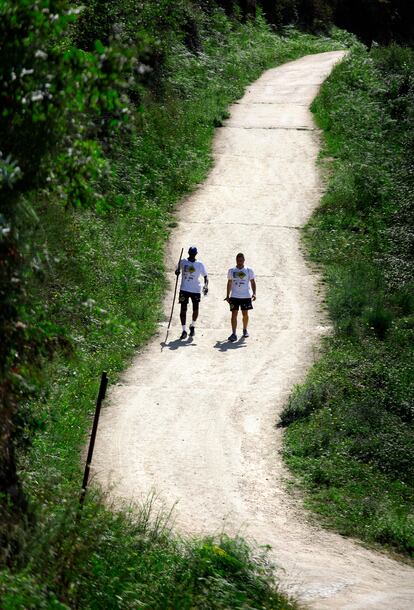A date has been burned into the mind and soul of Craig Hodges: 1991. That number is repeated over and over again in his head. And also in their conversation. Sooner or later everything ends in him. Because this former NBA basketball player had a taste of glory that season. He was 31 years old, broke the record for the All Stars 3-point contest - a figure that has not yet been surpassed - and played alongside Michael Jordan in a Chicago Bulls that were making history. In 1991 they won their first championship. But that was a bittersweet victory for Hodges. Because his success as an elite athlete collided with the born African-American activist that he was, and still is. “After winning I felt absolute happiness, but also a huge weight on my shoulders: that of taking over my mother's fight,my grandfather and my ancestors [slaves] for defending the rights, justice and equality of African Americans in the United States ”, he recalls today, aged 61, while doing the Camino de Santiago on his first visit to Spain. That 1991 he wanted to take advantage of his visibility to give a voice to those who did not have it. And he paid a very high price for it: exile. The NBA closed the doors of professional sports to him in his country for almost two decades. And even today, after being a 3-point coach for the Lakers and working in the American College League, he feels that year he left an indelible mark. "1991 was, without a doubt, a turning point for me."That 1991 he wanted to take advantage of his visibility to give a voice to those who did not have it. And he paid a very high price for it: exile. The NBA closed the doors of professional sports to him in his country for almost two decades. And even today, after being a 3-point coach for the Lakers and working in the American College League, he feels that year he left an indelible mark. "1991 was, without a doubt, a turning point for me."That 1991 he wanted to take advantage of his visibility to give a voice to those who did not have it. And he paid a very high price for it: exile. The NBA closed the doors of professional sports to him in his country for almost two decades. And even today, after being a 3-point coach for the Lakers and working in the American College League, he feels that year he left an indelible mark. "1991 was, without a doubt, a turning point for me."
The former NBA basketball player, next to the Ponte da Illa do Covo, in the city of Pontevedra.Francis Tsang
To understand its history, you have to rewind 30 years. Because, as he himself says: "My family is the foundation of everything." Hodges grew up in the United States of the sixties and seventies. In Chicago Heights, 50 kilometers from the city. Railroad tracks separated the huge Victorian houses of the whites from the decaying blocks where the blacks lived. They were years of mobilizations for the rights of their community. And his family was very active in all that. At just five years old, his mother, Ada, and his aunt Edna - the first university in the family - took him to march with Martin Luther King as he passed through the city. When he was eight, at the Olympic Games in Mexico 68, Tommie Smith and John Carlos raised their fists in the Black Power salute… Hodges remembers perfectly the admiration his uncles felt for that gesture.That made him admire them too. “When I think of my heroes, I think of Muhammad Ali, Curt Flood, John Carlos… All athletes with a conscience. And I remember how at home we talked about them and their impact. They became the types I looked at to decide how to behave. They made me understand that it was not about me, but about the community. "
Like those "heroes" of his childhood, Hodges wanted to vindicate social justice from his privileged position as an elite athlete. But by the 1990s, sports had become a multi-billion dollar industry in which all sorts of brands and political colors were implicated, and "uncomfortable" athletes, in Hodges' words, were "silenced." He says it from the calm that age gives. He does not practice any religion, although he has studied Islam, Judaism and Christianity in depth, and has become a cultured and “very spiritual” man, he explains. That is why he was enthusiastic about the idea of doing the Camino when the Obradoiro invited him. “It is an experience that must be lived. And to have the opportunity to come to Spain to talk about everything that happened… That is the change ”.
Hodges travels the Portuguese route of the Camino de Santiago on August 30. In this image, he walks with Gonzalo Rodríguez, assistant coach of Monbus Obradoiro.Francis Tsang
His journey begins on March 3, 1991, when the African-American taxi driver Rodney King was brutally detained by four policemen. Something clicked in Hodges's head. The players were excited, with the focus on their sporting aspirations. But Hodges could only think of Rodney King. In the photos before the game, he is seen with a blank look. He tells in
Long Distance Shooting
(Captain Swing), the book he wrote in 2017 to share his story, that he proposed to Jordan not playing the game, as a protest; who did the same with Magic; and that they both refused. "I did not have the support of those who I thought would help me: the players, the association ... Today I think that I cannot tell anyone what principles to have or how to behave."
After the Bulls' victory, the entire team was greeted at the White House. Hodges attended wearing his
dashiki
white, "the traditional robe worn by [West African] royalty on important occasions." “For me it was a cultural imperative. I had to go as my mother would have liked: with my clothes, which reflected well where I come from, ”he explains. He also delivered an eight-page letter to the press officer of President George Bush (Sr.) in which he exposed the problems of segregation and racial discrimination suffered by African Americans. "I'm sure the president never read it," he laughs. The letter did see the light in the media in 1991. That was the beginning of the end. “They told me that I had embarrassed the League, although I think I was very respectful. But after that, no team wanted to hire me. I couldn't get an agent. That shows you what the level of the conspiracy was in the NBA. " Ruined,Depressed and with no future expectations, he had to go to the Italian League, far from his family. "Life is crazy. Sometimes you have to do what you have to do. The hardest thing was knowing that my children [the elders, Jibril and Jamaal, then adolescents and now 37 and 35 years old] realized what was happening, but did not know the magnitude of it. " He was also in Sweden and Turkey. He returned to the United States several times in between pursuing an exoneration that took almost 20 years to arrive.He was also in Sweden and Turkey. He returned to the United States several times in between pursuing an exoneration that took almost 20 years to arrive.He was also in Sweden and Turkey. He returned to the United States several times in between pursuing an exoneration that took almost 20 years to arrive.
Hodges watches the views from the Camino.
In the background you can see the famous Rande bridge, in the city of Vigo.Francis Tsang
He retains the athletic and elegant demeanor of that time, but his arthritis and a right knee that time has deformed make it difficult for him to keep up on the road.
Avoid awkward postures, trying to ignore the pain.
“My grandmother, when you told her 'it hurts when I do this movement with my arm', she would reply: 'Well, don't do that movement with my arm”.
He bursts out laughing at the memory.
He smiles every time he talks about her.
Dorothy was the soul of the Hodges household.
The former basketball player grew up in a noisy and crowded home.
He shared a room with his mother, his grandparents, his eight uncles and his sister.
They lived in the
projects
(Subsidized housing blocks to house families without resources in which they ended up overcrowded). “I used to stay up at night. The poverty was so great… And we were all poor, but we [his family] did not have a poor mentality that made us feel that we were not worth it, ”he says proudly. "They told me that I could do something with my life, to preserve my rights, for my community and for the next generation."
Hodges was audacious because he had the courage to raise his voice in a sporting, social and political context that was not receptive. Today, he is witnessing how a new generation of athletes is openly taking a stand against racism, homophobia or machismo. They speak openly about bullying, abuse, anxiety or eating disorders. And that fills him with "joy". “See young people who are not only concerned about their sport. Who know that they can break the chains of oppression ”. He watches them and feels that his actions in 1991 were, in a way, the first impetus for that change. “And when I see Black Lives Matter, with people from all over the world crying with us for our pain. That didn't happen ”. As he speaks, a recent case suddenly comes to mind: that of Colin Kaepernick, which bears many similarities to his,but with a very different outcome. The American football player was banned in 2016 for protesting against the oppression of the black community in his country. His fight went around the world thanks to social networks. “I know he suffered, but it was different from my suffering. Because mine was in silence ”, he reflects. "Perhaps I myself would have been exonerated if the networks had existed in '91. But when I did it, no one told it." And that's why he does it today, raising his voice again, after a long road to redemption."Perhaps I myself would have been exonerated if the networks had existed in '91. But when I did it, no one told it." And that's why he does it today, raising his voice again, after a long road to redemption."Perhaps I myself would have been exonerated if the networks had existed in '91. But when I did it, no one told it." And that's why he does it today, raising his voice again, after a long road to redemption.
The former athlete walks during the second stage of his pilgrimage to Santiago de Compostela.Francis Tsang




